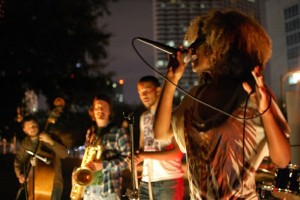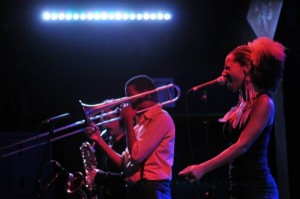Nasimiyu stands sweating shoulder-to-shoulder in a mass of dancing strangers, bouncing to the triumphant rhythm of trumpets, trombones, sousaphones and stomping feet as a gang of brass musicians march down weathered streets. She waves her arms in the air, releases any pinned-up anxieties, and lets the collective beat pulse through her body, embracing the crowd’s celebratory energy. This is exactly what she came to New Orleans for.
“At that moment, right then and there, I was like ‘Fuck, I can never live anywhere else now.’ I knew I wasn’t turning back,” says Nasimiyu. She leans in close, her voice charmingly animated, as she recounts to me her first second-line experience. “I went all alone, and I’m just retaking the streets and dancing with all these people, reclaiming the space,” she says. “At that point I felt like I was married to this place…I knew could never enjoy living anywhere else because I needed this in my life.”
This was September 2009, at the Black Men of Labor Social Aid & Pleasure Club’s annual Labor Day second line. Nasimiyu Murumba, the singer, songwriter, pianist, and producer from Minneapolis, has now lived in New Orleans for nearly three years and is in no hurry to leave. Her songs have been greatly influenced by her new locale. In 2010, she released the EP It Ain’t Pretty, But It’s Beautiful, which pays tribute to her initial encounters in New Orleans, both good and bad. Since then her songs and sound have grown even more, and on Friday she’s releasing her first full-length album Rules Aren’t Real and celebrating with a release party at the Big Top.
[youtube]http://www.youtube.com/watch?v=eiaS2PbgxD0[/youtube]
Nasimiyu is one busy artist—intimidatingly so. She sits comfortably in a loose tank on an early Sunday afternoon outside of her favorite coffee shop Cafe Envie. It’s a lively caffeine haunt at the edge of the Quarter that attracts everyone from poets to tourists to heroin-addled hustlers. Her hair, a globe of ultra-curly ringlets, is a perfect reflection of the personality she exudes—quirky, bold and uninhibited. Sipping on a peppermint tea, a miraculous remedy for any sore throat, as she tells me, Nasimiyu passionately details the countless projects with which she’s currently involved, while remaining nonchalant about the extensiveness of her activities. Besides the band she leads, she’s also one half of the duo Saint Bell along with singer/songwriter Jeremy Phipps (who in turn plays trombone in her band). This January, she became the director of a new theatre program called “InterAct”, which is based on a program that originated in Minneapolis that engages adults with disabilities in the performance arts—from song and dance to acting and improvisation. Her eyes light up and her smile extends as she tells me about the participants’ “big personalities” and calls them “improvisational geniuses,” asserting that they can outdo any one of their instructors in that category. The artistic everywoman also serves as a vocalist in the funk band MinuteHead led by Tulane student and guitarist Elliott Slater, and she recently joined a jazz quartet called The Rainy Days.
“[Music] was the first interest that I ever had,” the Nasimiyu says. “When I was three or four, I can remember using anything for a stage—a couch, a picnic table, anything I could stand on—and using anything for a mic, like a hairbrush or what have you,” she adds, imitating pretending to hold an air mic in her hand. She was as ambitious in her childhood as she is now. She still has recordings of the first songs she ever wrote, from the age of four. When her parents denied her music lessons at 10 years old, she took it upon herself to learn piano on a “dinky Yamaha keyboard” using its pre-loaded classical music demos. Her first experiences on stage came with Cirque Rouge, the first traveling burlesque troupe in the Twin Cities, when she was eighteen. She started out performing ballet numbers and eventually began singing with the troupe’s house jazz band. “I’ve always been drawn to jazz, old soul like Billie Holiday and Jack Kerouac and people who were really influential in the sixties,” she explains, “so it’s not at all something that I think about, its just something that’s a part of me and no matter what, every time I open my mouth, something jazzy comes out.”
In the three years since her spontaneous move to New Orleans, Nasimiyu has held a series of “bizarre” jobs in the city, and she recounts anecdotes of working late nights on Bourbon Street, traveling with cabaret troupes, working alongside tarot card readers and fortune tellers, and performing “crazy—I mean crazy” gigs. In fact, it was one of her bizarre jobs that solidified her desire to relocate to the Crescent City.
“I never decided to move to New Orleans,” she says, “it just happened.” Having read numerous histories of jazz, Nasimiyu set out on a solo “pilgrimage” to its homeland in summer 2009. “It was kind of akin to a Muslim traveling to Mecca to make that big pilgrimage to the birthplace of what they worship,” she says. She had seven days scheduled for the trip, and on the third day, while exploring the French Quarter, she was snapping a photo of a “Help Wanted” sign outside of a voodoo shop on St. Peter Street, a token for her friends back at home who had nicknamed her “Voodoo.” Intrigued, she went inside and chatted up the owners, eventually inquiring about the sign. Within a few minutes, they’d written down a schedule for her to begin training for the position that same week—before she’d even had a chance to reveal that she was only a visitor. The curious side of her couldn’t pass up the opportunity. “Studying cultural anthropology taught me that these are exactly the kind of experiences that I wanted to look for in my life,” she says. “I kind of viewed it as an internship. I was like, ‘Oh my god, I can work at a voodoo shop in New Orleans? That’s the perfect way to study this culture!” At first she thought she’d only try it out for a couple of weeks, then weeks turned into months and months turned into permanent residency. Her experiences at the voodoo shop influenced much of the songs on her EP, in both major and minor ways.
“You don’t choose New Orleans, it chooses you,” she tells me. “To some people it just says, ‘Oh no, you’re mine now, you can’t leave.”
She had a lot of stage experience under her belt before coming to New Orleans, but in some ways she has Bourbon Street and karaoke to thank for getting her comfortable in front of an audience. For over a year, she held down a job as a stage host at a gaudy karaoke bar, the standard Bourbon Street joint locals know and avoid so well. “I logged 25 hours of stage time a week…as crazy as that experience was and as unpleasant as it was almost 100 percent of the time, it really wiped out any stage fright I ever could’ve had,” Nasimiyu says. It also fostered an ability to cater to any audience with ease, to engage any crowd no matter how diverse…or intoxicated.
She notes the irony of her situation. “I always felt like it was a really weird anomaly that I was a part of. I spent all my days at my piano banging out as many original songs as I could, and then I spent all night singing other people’s songs. That’s how I would describe my experience thus far in New Orleans: making a living singing other people’s songs so that I could eventually work on my own.”
“I feel so wonderful to have left Bourbon Street in my past,” she says, “I learned what I needed from it.”
Low funds tested Nasimiyu’s dedication, but she put forth a strenuous effort to make the album happen, and throughout a grueling year of odd gigs and undesirable diets, she survived while putting her music first. “The most difficult part [of releasing this album], hands down, has been funding,” she says. “I’ve been completely on my own. I worked some crazy gigs to fund this album, and I gave up every luxury for over a year—I mean every luxury you can think of. I even gave up basic necessities so that I could build this album because to me, getting this off my chest was to me a basic necessity, more than rent, more than food,” she says. “Thank God for free red beans and rice night! That’s all I have to say!” she declares with a humble laughter that lightens the serious tone.
“I’ve just found a way to be thankful for it,” she adds, “because it has allowed me to look back and be proud that I made such a sacrifice for something that was so important to me.”
Now she’s finally able to see the product of her hard work culminate with her debut album, one that is politically charged, sonically diverse, eclectically original, and authentically Nasimiyu.
“I just exercised no restraint. I said, ‘Your album is your room in which you may do whatever you feel the need to do, and you don’t need to tone yourself down or accommodate anyone else. This is your space.’ And so I absolutely didn’t allow any of those outside voices who were trying to push me in one direction or another because I knew this was my creative space.”
She credits the Music Shed’s Ben Lorio, the album’s engineer, for resuscitating the project. “This record was on its deathbed a couple of months ago,” she admits. “It didn’t look like it was going to happen, and it wouldn’t have if Ben hadn’t come along and saved the day…He really just believed in me as an artist when a lot of people didn’t, and I have him to thank for that.”
She describes her sound on the new album as “colorful.” Nasimiyu doesn’t manifest one definable, signature sound or stick to a single era of influence. Some listeners argue that each song sounds like a different genre, and sometimes even a wholly different band.
“I think it’s fair for artists to be able to be multi-dimensional instead of being expected to fit so neatly into boxes all the time,” she adds. She compares it to a painter being limited to a specific palette of just a few colors. “Sure, it may be more marketable,” she says, “but you’re cheating yourself out of the rainbow of things you could be doing creatively. I tried for a while to stick to one thing and I just decided I’d be cheating myself out of having a full canvas to paint from as an artist.”
She admits some of the tracks can delve into strange territory, like the album’s opening track. “Some of the tracks on the album are super experimental and different, tracks I just recorded in my bedroom with GarageBand and no mic, experimenting with vocal layering and stuff,” she says. “Some of my musician friends were like, ‘Simi, it gets a little out there sometimes. I don’t think you want to include this,’ but those ended up being the songs that I was really excited to put out. The fact that it scares my friends, the fact that it freaks them out and makes them feel a little bit worried or uncomfortable…those were the songs that I felt I definitely couldn’t cut off the record, because those were the only songs that were just me, by myself, playing in my room at my purest.” She acknowledges that the songs are risky ones, “But I believe in risky art,” she says. “I don’t believe in making safe art at all…if you’re not taking a risk then you’re doing something wrong.”
Her lyrics are both intimate and universal. “The messages are basically dialogues I wanted to open with the world, and that I wanted people to open up with each other,” she says. “I knew that I didn’t want to make a record that was like, ‘Check me out and listen to all of my problems and what I’m doing with my romantic life right now,’” she says in an mocking tone. “‘No. I’m like, ‘Let’s talk about the political climate globally, let’s talk about societal pressures, let’s talk about what it means to be a woman and an artist.’ Those are the kinds of issues I brought to the table with this album because you only get a few chances in life to speak your peace.” And from the fervor in her voice and the way she unconsciously lays a fist down across the table as she elaborates, I can tell she’s passionate about these ideas and the philosophy embodied in record’s title track, “Rules Aren’t Real”.
Her favorite new song to perform is “War Paint”, an emotionally charged song during which she admits she often loses composure. “It’s got this super-hard driving energy, and it has so much emotional resonance for me. That’s the one song that I sometimes fall out of my chair singing. I just lose it, you know? Sometimes I don’t even sing that song into the mic. I just go to the front of the stage and yell it into the crowd, even towards the end, I just get so worked up.” Her voice is bold, ardent and at times angry. When she performs, as when she talks, she uses assertive hand gestures to complement her passion.
She hopes to inspire with some of her new works. “I feel like the most revolutionary changes that I’m able to make in this day and age as this individual that I am is to encourage people to find a revolution in themselves.” Nasimiyu reprimands the mainstream media for its current musical offerings and lack of substance, and even recommends psychiatric help to some of its producers. “When you turn on the radio, you won’t hear a single natural instrument, a single natural voice. You won’t hear anything real,” she says. “It just contributes to this culture that tells you that to be valuable in any way you have to be fake, and I want to change that.
“The music that is getting pumped down kids’ throats these days is toxic…All of the role models these kids have are just clinically insane. Like Lil’ Wayne? Come on!”
Her current artist inspirations include Theresa Andersson and Janelle Monae. She’s impressed with Andersson’s rapid creative progress and charmed by Monae’s ability to spark a cultural movement. “My standard of what you can do with music and how far you can grow has been just blown away by what [Andersson] has done,” says Nasimiyu. “I mean her last album Hummingbird, Go! was great, but the growth she’s exhibited between then and now is just sick.” As for as Monae, Nasimiyu remarks that what she’s created is “more than just music. It’s a movement, it’s a culture, it’s a community-building effort that she’s put together, and I would love my music to be at the center of some kind of building of community as well. That’s why the ’60s were so full of revolutionary energy. It was because of the art at the center of it all that was bringing people together.”
To gain creative inspiration, Nasimiyu often returns to that initial experience that attracted her to New Orleans. “Second lines refresh me in every way—spiritually, physically, creatively. I always feel like I’m just taking a big shower, like a fresh rinse,” she says. “I can just shake everything off and start fresh.” But she doesn’t seem lacking in creative energies as of late. “I’m already done writing the next album,” she says, then pauses—“and the next album, so I’m looking forward to getting back in the studio with Ben Lorio. My band tells me to take a break, but it’s so hard when they’re already ready and waiting.”
Of her ultimate musical goal, she says, gazing across the street contemplatively, “In the grand scheme of things, at the end of my career, if I can look back and see that I have put out bodies of work that are healing to people in the way that other people’s work has been healing to me…if I can just pay some of that back, some of what artists have done for me in my life, I’d be really happy.”
Right now though, she’s focusing on Friday night, releasing her first album, and reveling in the gravity of the personal accomplishment it represents.
“Up until releasing this album I never felt like I had contributed something to the world that would explicitly deliver the truth and wisdom that I worked so hard to gain in my lifetime. It’s like your whole life you work to gain clearer understandings, and are you just going to let it end with that or are you going to put it in the world so that it can last beyond you so that it can contribute to other people developing some clarity as well? I feel like everyday after this album is in the world and that it’s something beyond me, I can just breathe a little easier because I know that I’ve left a mark in a way that is redeeming.”
On Friday, June 29, Nasimiyu’s Rules Aren’t Real will be available digitally on Amazon, iTunes, and other sites, and in hard copy at Louisiana Music Factory and Euclid Records. The CD-release party starts at 9 p.m. at the Big Top on Friday.








